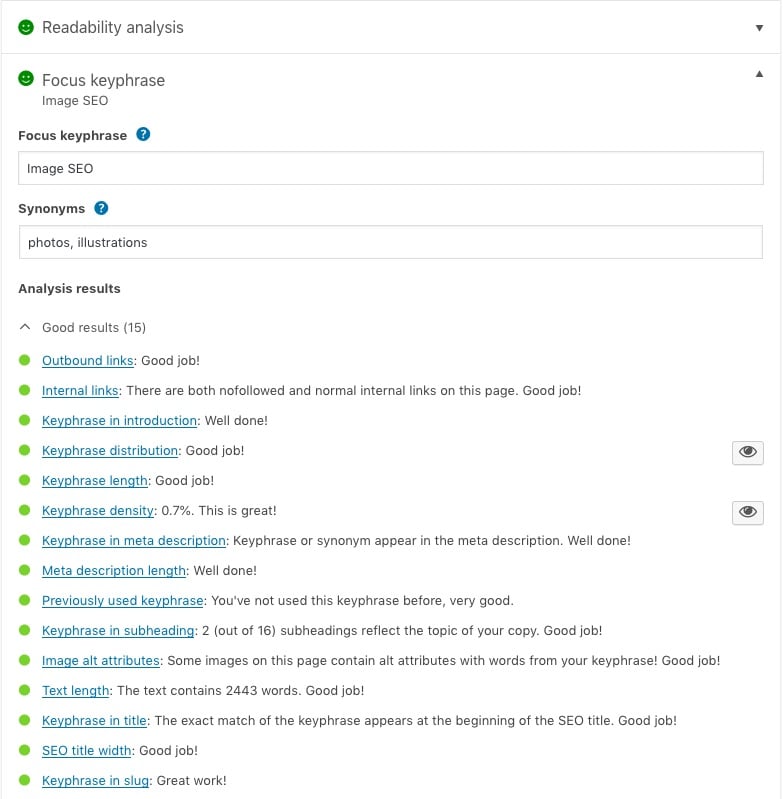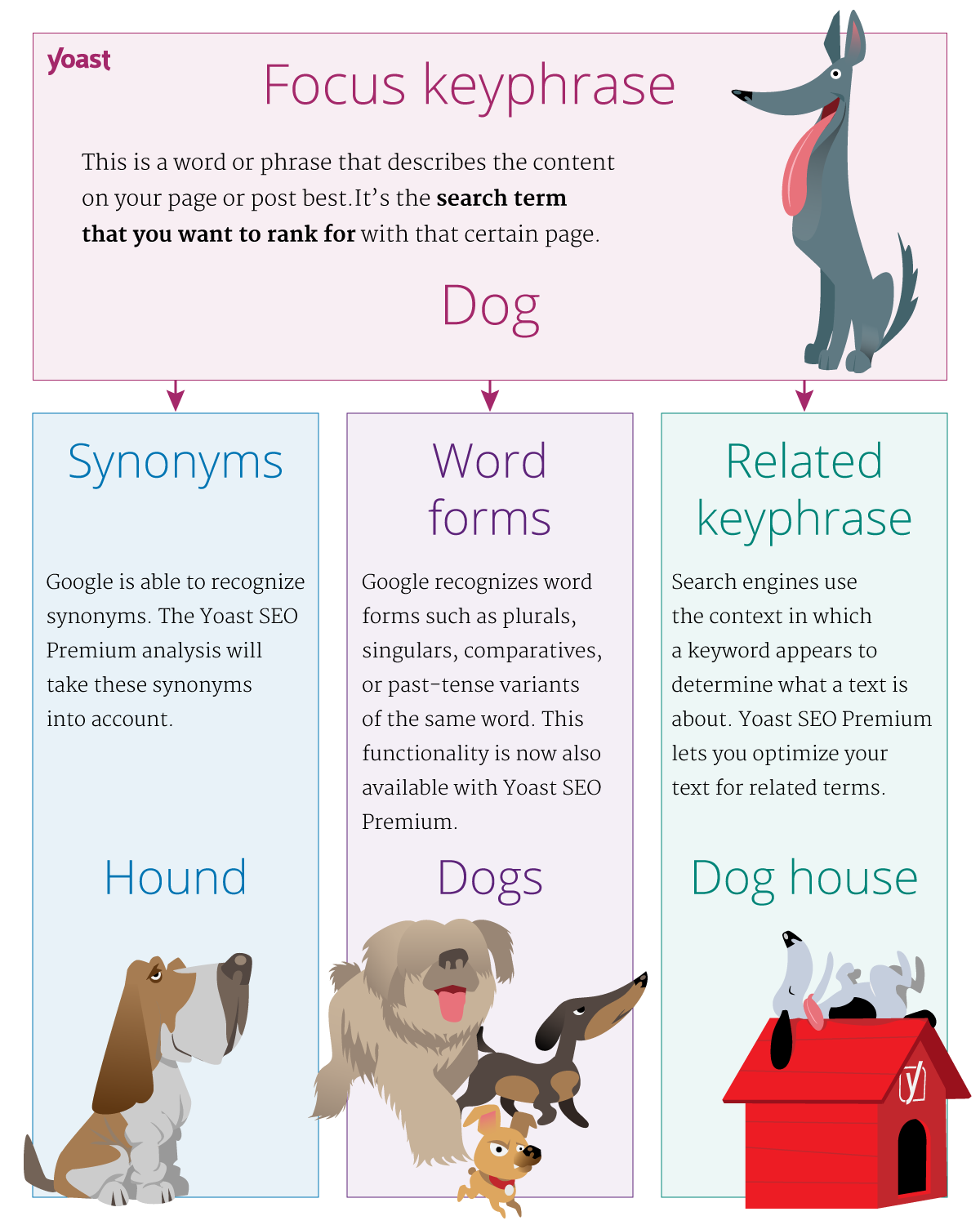Yoast SEO 9.0: A much improved SEO analysis

Welcome to the dawn of a new era. For ages, Yoast SEO has helped you optimize your content using a focus keyword. This works well but could be a lot more flexible. The plugin only recognized an exact match of your keyword and didn’t take plural forms into account, for instance. So, sometimes you had to work according to the rules of the plugin rather than the rules of good writing. Today, we’re turning our text recognition in Yoast SEO up to eleven! Yoast SEO 9.0 makes it easier and more enjoyable to write a perfect, SEO-friendly web text.
As of today, Yoast SEO does recognize those keyphrases when they are spread out over a sentence. Even if you put some extra words in between. And the words don’t even have to be in the same order! So if your focus keyphrase is [make vegan pancakes] we not only recognize that exact match but a sentence like [How to make the best vegan pancakes in the world] counts as well. Just make sure the content words of your focus keyphrase are inside a sentence and you’re good to go.
What’s more, Yoast SEO Premium now also supports word forms. Currently, this only works for the English language. What does this mean? Well, we recognize all the different word forms — e.g., make, made, makes, making — of your focus keyphrases and synonyms. This is called keyword stemming. So if you’d write [making a vegan pancake] somewhere in your article, that would count as well. This way, we can do a much more realistic analysis of your text. Now we can give you the best possible advice to make your text more readable, understandable and findable for both humans and search engines. We know you are going to enjoy this new-found freedom! Other languages will follow soon.
Brand-new SEO analysis
Yoast SEO 9.0 comes with a much improved SEO analysis. We drastically changed how we check the use of keywords — or keyphrases as we now call them — in texts to make it much more realistic and flexible. For most checks, it doesn’t matter anymore if the words in the keyphrase are put in the text in the same order and whether other words separate the words in the text.
This change concerns the checks that search for the keyphrase in the text, in the subheadings, in the meta description, the image alt text and in the slug. The SEO title assessment uses the exact match as users will probably look for content that fits their search query.

We have improved the feedback we provide as well. You get much more actionable advice to make your post awesome. On our site, you’ll also find new content explaining the assessments and how to improve your scores.
Filtering function words
Search engines read texts to find meaning, but generally, ignore so-called function words while doing that. Function words — e.g., the and who — have generic meaning, which does not help to determine what the text is about and by which search request they should be found. As of Yoast SEO 9.0, we’re no longer looking at the function words in a focus keyphrase. These words only get in the way of the content analysis, so this makes it easier for us to detect the words that matter most, regardless in which order they appear. If you want, you can override this — and all other new checks — by adding your focus keyphrase in quotes. So, if you run a fan site about the English rock band The Who, you can force an exact match result by making your focus keyphrase “The Who.”
Currently, we can only filter function words from languages which we support: English, German, Dutch, French, Spanish, Italian, Portuguese, Russian, and Polish. More languages are on the way.
Yoast SEO Premium: Word form support — English only for now
In addition to all that general awesomeness in Yoast SEO 9.0, the Premium version gets awesomeness times two: word form support! We now recognize all word forms – e.g., singulars, plurals, comparatives or past-tense variants — of your focus keyphrase.
Sound abstract? Well, let’s take the vegan pancakes mentioned above as an example. With your focus keyphrase being [making vegan pancakes], the plugin would now look at different word forms to see if there are alternative matches within the content. [Yesterday, I made the tastiest vegan pancake.] This sentence would now count as a hit because Yoast SEO Premium knows that [made] is a word form of [making].
In practice, it means that we will now recognize your keyphrase (or a synonym) in the text even if the words appear in a different form. This gives you much freedom, as now you do not have to use the same keyphrase in your text to make it findable by the plugin.
For now, this only works for English, but we’re going to expand that.
Yoast SEO Premium: A better synonyms check
Search engines increasingly use the context surrounding terms to build a complete picture of what that term means. Previously, you had to add those terms into your content without any guidance from us. Today, with Yoast SEO 9.0 Premium, we can help you optimize your text with synonyms and related terms. This way, you can make sure that you’re doing everything in your power to improve the search engines’ recognition of your content.
Some other familiar checks now rely equally on your keyphrase and its synonyms when calculating the score. No more need to repeatedly use your keyphrase in the introduction, meta description, subheadings, and image alt text. You can use a synonym there, and the relevant check will still give you a green bullet. Just like with normal keyphrases, the plugin will also warn you if you’re linking to another article with a synonym.
Last but not least, we have the related keyphrase feature. You can use this to build up context around your main focus keyphrase. In this field, you can add concepts that are not direct synonyms of your focus keyphrase, but that are important to broaden and deepen the understanding of a topic. For related keyphrases, we now show checks that are specific for the keyphrase, and we only show you things you should improve with regards to that keyphrase.
The synonym and related keyphrase features offer a much better and more flexible way of optimizing your text for a broader context. Once you start using it, you’ll immediately see how brilliant it is!
Focus keyphrases, synonyms, word forms, related keyphrases — huh?

With Yoast SEO 9.0, we’re introducing a lot of new terms and concepts. To make those terms come alive, we’ve created an infographic that shows what this is all about and how everything ties together. In addition, we have a page explaining all the terms in-depth: Yoast SEO glossary of terms.
Update to Yoast SEO 9.0 and let us know what you think!
This is a major release of Yoast SEO, and we’re extremely proud of what the team built. Text analysis is notoriously hard to do, and it takes a lot of work to make it into an actionable product. But we’ve done it! Yoast SEO is now a lot smarter, more helpful, easier to use and, above all, more flexible. This new text recognition engine lets you optimize your content naturally, without using tricks and workarounds to get the plugin to show that coveted green bullet.
A final note, as this is such a big release, we’re looking for feedback on the new analysis. Is it too strict? Does it make your work easier? Did you find bugs? Have suggestions to improve it? Please help us make it even better by submitting your input on the Yoast SEO GitHub page. You are welcome to comment on this article as well.


Discussion (27)